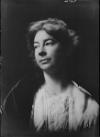Biography
Other info : Career | Furtherreading | Bibliography
Sara Teasdale received public admiration for her well-crafted lyrical poetry which centered on a woman's changing perspectives on beauty, love, and death. Many of Teasdale's poems chart developments in her own life, from her experiences as a sheltered young woman in St. Louis, to those as a successful yet increasingly uneasy writer in New York City, to a depressed and disillusioned person who would commit suicide in 1933. Although many later critics would not consider Teasdale a major poet, she was popular in her lifetime with both the public and critics. She won the first Columbia Poetry Prize in 1918, a prize that would later be renamed the Pulitzer Prize for Poetry.
Critics found much of Teasdale's poetry to be unsophisticated but full of musical language and evocative emotion. A New York Times Book Review contributor, writing about the 1917 edition of Love Songs, asserted that "Miss Teasdale is first, last, and always a singer." Reviewing the 1915 volume Rivers to the Sea, another New York Times Book Review contributor deemed the book "a little volume of joyous and unstudied song."
Teasdale's work in the 1926 book Dark of the Moon demonstrates her sensitivity to language, according to New York Times Book Review contributor Percy A. Hutchison. Hutchison praised "the exquisite refinement of Sara Teasdale's lyric poetry," which "shows how near Sara Teasdale can come to art's ultimate goals." Marguerite Wilkinson, writing in the New York Times Book Review and Magazine, commented on Teasdale's poetic development in 1920's Flame and Shadow, noting that "Sara Teasdale has found a philosophy of life and death," having "grown intellectually since the publication of her earlier books" and displaying a "growth in artistry." Wilkinson concluded that Flame and Shadow "is a book to read with reverence of joy."
Saturday Review of Literature contributor Louis Untermeyer, reviewing Strange Victory shortly after the poet's death, also commented on Teasdale's development. Untermeyer insisted that Strange Victory "must be ranked among her significant works," that its "beauty is in the restraint" of its "ever-present though never elaborated theme." Reviewing the 1984 collection Mirror of the Heart: Poems of Sara Teasdale, Choice contributor J. Overmyer voiced similar opinions of Teasdale's poetry, as its "simply stated thoughts are complex . . . and reverberate in the mind."






